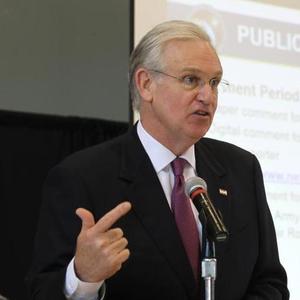Lame duck Missouri Gov. Nixon pulls a dine-and-dash on biodiesel

Photo: The Office of Missouri Governor Jay Nixon
September 26, 2016
BY The Missouri Soybean Association
When Missouri Gov. Jay Nixon cut the state budget in response to overridden vetoes, he undid the legislature’s work to pay Missouri’s debts for renewable fuels work he has lauded.
“In his haste to respond to decisions made by our legislature, Governor Nixon has fallen into the trap of robbing Peter to pay Paul,” said Gary Wheeler, executive director of the Missouri Soybean Association. “Cutting the dollars budgeted to repay debt under Missouri’s Qualified Biodiesel Producer Incentive Fund only serves to kick that particular can down the road to the next administration.”
Advertisement
Advertisement
The biodiesel fund is currently $9.6 million in arrears. The legislature had fully funded repayment during Missouri’s springtime legislative session, but Nixon’s budget cuts this summer and again in September turned that black ink back to red. This marks the third time Nixon has set aside efforts to pay what Missouri owes. He also cut the legislature’s efforts to repay the debts in 2014.
“In the business world, we are required to pay our debts,” Wheeler said. “We appreciate that the legislature understands the state of Missouri should be no different. Governor Nixon has been quick to recognize the jobs and economic impact our soybean farmers and biodiesel plants generate, but is now attempting to leave those same folks holding the bill while he exits stage left. It’s a shameful parting gift to those in agriculture who not only supported him the last eight years, but who have also already paid the taxes associated with that $9.6 million.”
Biodiesel alone supports nearly 2,500 Missouri jobs and has created more than $1.7 billion in value-added benefit to Missouri’s GDP since 2007. Nixon has not shied away from drawing attention to those impacts—and himself—by visiting biodiesel plants to highlight the industry and its contributions to Missouri. Likewise, in his role of providing leadership on the Governor’s Biofuels Coalition, Nixon has championed both the environmental and economic benefits of advanced biofuels, of which biodiesel is the only one in the market today.
Advertisement
Advertisement
The Missouri Qualified Biodiesel Producer Incentive Fund, administered by the Missouri Department of Agriculture, was established in 2002 to provide limited funding to Missouri-owned plants using soybeans and other products grown in Missouri to produce the fuel. Funds were available for a maximum of 60 months.
The Missouri Soybean Association is a statewide membership organization designed to increase the profitability of Missouri soybean farmers through advocacy and education efforts across the state.
Related Stories
The U.S. Department of Energy’s Office of Energy Efficiency and Renewable Energy is soliciting public comments on a preliminary plan for determining provisional emissions rates (PER) for the purposes of the 45Z clean fuel production credit.
A new study published by the ABFA finds that the U.S. EPA’s proposal to cut the RIN by 50% for fuels made from foreign feedstocks, as part of its 2026 and 2027 RVOs, could stall the growth of the biomass-based diesel (BBD) industry.
Reps. Mike Flood, R-Neb., and Troy A. Carter, Sr., D-La., on July 21 reintroduced the SAF Information Act. The bill directs the U.S. EIA to more explicitly include SAF data in its weekly and monthly reports.
The U.S Department of Energy Bioenergy Technologies Office, in partnership with the Algae Foundation and NREL, on July 21 announced the grand champion and top four winning teams of the 2023 - 2025 U.S. DOE AlgaePrize Competition.
The European Commission on July 18 announced its investigation into biodiesel imports from China is now complete and did not confirm the existence of fraud. The commission will take action, however, to address some systemic weaknesses it identified.
Upcoming Events










